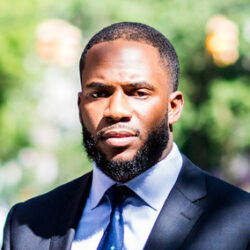Charles Savage and Marvin Pierre both work in Harris County—the county with the highest number of incarcerated children in Texas.
Charles is the Executive Director of the Fifth Ward Enrichment Program which, since 1984, has worked to disrupt the school-to-prison pipeline by providing Black and Latino boys with mentors, tutoring, and career-awareness and life-skills workshops. The program is unique in that it is one of the only in the country that hires full-time mentors—receiving full-time salaries with benefits—to work on-site at district public schools. Alongside other paid staff and community members, mentors also run afterschool, weekend, and summer programs.
Marvin is Executive Director at Eight Million Stories, which he started during his Bridge Fellowship year with TNTP. Serving formerly incarcerated young men ages 16 to 18, the program gives kids the education and resources they need to earn their GED, while also pairing them with jobs and apprenticeships. There is also a heavy emphasis on case management and mentorship, to provide kids with everything they need to succeed, and not return to prison.
Charles: What initially brought Marvin and I together was our shared belief in the importance of the male role model in keeping kids out of the juvenile justice system. Marvin approached me just after beginning the Bridge Fellowship, and since then we’ve had many, many long conversations about the challenges and opportunities our boys and community bring us.
One thing that’s never been a challenge for either of us is recruitment, as boys tend to gravitate toward male role models. Also, after 34 years in the Fifth Ward community, many of the parents know about our program and are eager to bring their kids to it. We’ve even had a few fathers who are graduates of the program enroll their sons—which means those fathers are not in jail, they are not absent, they are not missing; they are home with their boys. And they want their boys to have access to other male role models, too.
Marvin: Like Charles, I’ve seen how giving young men the chance to build relationships with adult men who have been through challenging experiences and learned from them is critical to helping our boys stay out of the criminal justice system. In contrast, though, out of close to 100 kids who’ve been part of Eight Million Stories, I’ve only had two parent intakes where the father was a part of the conversation.
After engaging dozens of young people in just 16 months, I’ve seen that every one of them is seeking the opportunity to do the right thing. We named our program Eight Million Stories because of that; the name comes from a song by A Tribe Called Quest. At the end of it, there's this kind of repetitive phrase that says, “Help me, help me, help me.” Though there are a handful of kids who make poor choices intentionally, overall, when you look at the system, there's a massive concentration of children who are in there for doing things they genuinely regret doing. Not just because they got in trouble, but because they want to be good people.
Charles: I see a lot of that in my boys, too. When a child enters our program, he sees the same male mentor every day, and more than likely, at first, the boy brushes him off; he doesn’t want to be bothered. A boy might ball his fist up, he might get angry and even have a verbal confrontation, but that same man will come back the next day and challenge him to be a better person. Since the majority of the teachers in our schools are women, some of the 12-year-old boys entering our program have never taken instructions from a man before—and here he’s dealing with a man who won’t back down.
Once that rapport is built, we can start providing those consultations on his attendance at school. Why is he not coming to our program on time? Or, why did he have an altercation with a teacher? And we can start disciplining him by doing things like taking him off the list to attend a Houston Rockets basketball game or the weekend camping trip. If he comes in at the age of 12, we hope that by the time he's 18 or 19 he's graduated from high school, growing with us along the way. He's grown through the mandatory life-skills training where we talk about things like physical and emotional health, dating, and sex, alongside our leadership and academic programs. And, of course, he’s grown through mentorship.
Marvin: Eight Million Stories is similar, with our own share of unique challenges. Here, we have this amazing opportunity to take a population of boys who generally haven’t had any successful outcomes in their lives, and through conversations with me and other staff members, we guide them to getting where they want to be. The unfortunate piece is many of the kids that we are working with have not been successful in traditional school settings, or they have not been invited back to school post-incarceration. Often, they are left with no alternatives when it comes to completing their education or getting the job readiness training they need. In Texas, we spend over $130,000 per kid in our prisons, while only spending about $10,000 per kid in our public schools—so, that tells you a lot about where our priorities are as a state.
We hope that by providing the necessary academic and vocational training as well as addressing their social-emotional needs, we can close those gaps. Each kid has a customized career pathway designed just for them, based on their immediate needs and their aspirations. But it’s not the fact that we provide all these services that makes us special—they can get that anywhere. It’s that this building is a safe space where they can be who they want to be without being judged based on what they’ve done in the past. They appreciate the opportunity to reset and figure out how to move forward in a positive way.
Andre, who we talked to on the blog about a year ago, comes to mind. He’s still working on his GED and works at Minute Maid Park as well as the Toyota Center. He got promoted to Shift Manager at Minute Maid Park, so now he’s training young people who are new to the role, mentoring other kids from Eight Million Stories who ended up getting placed there. He loves it. One of the big things for him has been showing the younger kids the importance of being on time to work and taking the position seriously. He tells them, “Hey, you just need to start somewhere and work your way up. Look at me; I started where you are, and now I manage you guys. If you focus, you’ll be in a better place.” Of course, there are some things he’s still working through from his past, but Andre's a young man that I’m confident will have a remarkable testimony when it's all said and done. He's been through so much and is still standing, and I think that speaks to the kind of kids we work with.
Charles: Andre is such a great kid—with a great attitude, too. His story makes me think of a conversation we had recently about the importance of skilled workers. There is a massive need in our city for construction workers, auto mechanics, electrical engineers, welders, things like that. But in our schools, we’re not training our children to go into these trades where, frankly, they would make more money after a year or so at a community college than a kid might coming out of a four-year university with a bachelor’s degree, in many cases.
I’ve heard so many kids say, “School is supposedly making me ‘college ready,’ but I don’t want to go to college—I want to make money. I want to provide for my family. I want to have a better life.” So, if a kid doesn’t want to go to college, it’s our responsibility to show them all the options they have to get what they want. When I look toward how I see the program growing, I see us working more directly to match the needs of our city to the needs of our kids.
When I think about keeping kids out of the juvenile justice system, it’s about giving them a reason to do better; rethinking “college ready” to include enrolling in an 18-month certification program, or whatever it takes to help them achieve their dreams. It begs the question: if the education system isn’t helping kids get where they want to be, then what are we doing?
Learn more at www.eightmillionstories.org.





